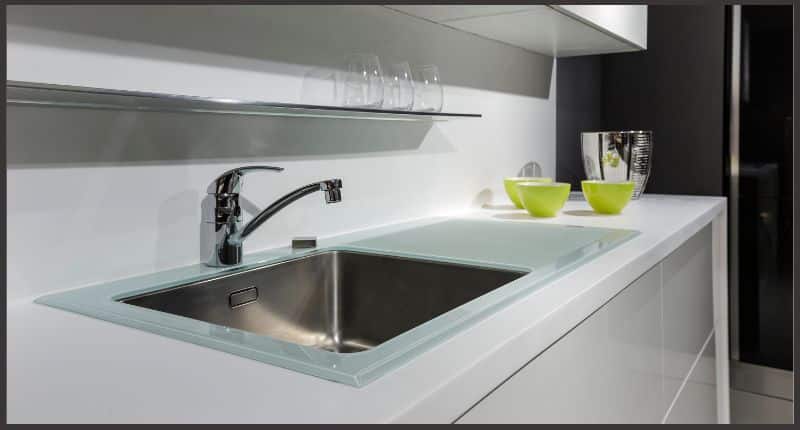Keeping your kitchen sink clean is an essential part of maintaining a hygienic and functional kitchen. A clean sink not only enhances the overall look of your kitchen but also ensures food safety and proper sanitation. From lingering food particles and grease to stubborn stains, there are numerous challenges when it comes to keeping your sink spotless. In this guide, we will explore effective tips and tricks to help you keep your kitchen sink clean and sparkling. With these simple techniques and regular maintenance, you can ensure that your kitchen sink remains a sanitary and inviting space for all your culinary needs.
Table of Contents
How to Keep Your Kitchen Sink Clean: Your Ultimate Guide
A clean kitchen sink not only enhances the overall aesthetics of your kitchen, but it also plays a vital role in maintaining a healthy environment. From washing dishes and preparing food to even occasionally bathing your little ones, it’s no wonder the kitchen sink can be a breeding ground for germs and bacteria if not properly maintained. In this comprehensive guide, we’ll explore effective tips, discuss common mistakes to avoid, and provide you with expert insights on how to keep your kitchen sink sparkling clean.
Why is it important to keep your kitchen sink clean?
Your kitchen sink is exposed to numerous sources of dirt, grime, and bacteria on a daily basis. Failure to keep it clean can have serious consequences on your health and wellbeing. Here are a few reasons why you should prioritize a clean kitchen sink:
- Prevent the spread of harmful bacteria: The warm and moist environment of the sink provides the perfect breeding ground for bacteria, including E. coli and salmonella, which can lead to food poisoning and other illnesses.
- Maintain a fresh-smelling kitchen: Lingering odors from food scraps and dirty dishes can quickly take over your kitchen, making it an unpleasant space to work in or entertain guests.
- Preserve the lifespan of your sink: Regular cleaning prevents the build-up of stains, mineral deposits, and hard water spots, which can damage the surface of your sink over time.
Effective Tips to Keep Your Kitchen Sink Clean
1. Clean your sink daily
Make it a habit to clean your sink daily. Start by rinsing off any food scraps and debris before washing your dishes. Use a mild dish soap and warm water to clean the surface of the sink, including the faucet and handles. Finish by drying the sink thoroughly with a clean towel to prevent water spots and mineral deposits.
2. Avoid abrasive cleaning tools
While it may be tempting to use harsh abrasive cleaners and scrub brushes to tackle stubborn stains, they can actually damage the surface of your sink. Opt for non-abrasive cleaners and soft sponges or microfiber cloths to gently clean your sink without causing any scratches.
3. Use natural cleaners for a chemical-free approach
If you prefer to go chemical-free, there are several natural cleaners that can effectively clean and deodorize your sink. For example, a mixture of baking soda and vinegar can effectively remove stains and eliminate odors. Sprinkle baking soda on the surface of your sink, spray vinegar over it, and scrub using a soft cloth or sponge. Rinse with water and dry thoroughly.
4. Pay attention to the drain
The drain is often overlooked, but it can become a breeding ground for bacteria and unpleasant odors. Regularly pour boiling water down the drain to flush out any grease or food debris. To remove odors, pour a mixture of vinegar and hot water down the drain and let it sit for 15 minutes before rinsing.
5. Keep your sink accessories clean
To maintain a truly clean sink, it’s important to clean the accessories that come into contact with it. Wash your dish rack, soap dispenser, and sponge holder regularly to prevent the growth of mold and bacteria. If possible, opt for accessories that are easy to disassemble and dishwasher safe.
6. Address stains immediately
Stains can quickly become stubborn if left unattended. As soon as you notice a stain, take action to remove it. Use a mixture of lemon juice and baking soda for stainless steel sinks, or a paste of hydrogen peroxide and baking soda for porcelain or ceramic sinks. Apply the mixture, let it sit for a few minutes, then scrub gently and rinse thoroughly.
Common Mistakes to Avoid
While you now have a solid understanding of how to keep your kitchen sink clean, it’s also important to identify and avoid common mistakes that can hinder your efforts. Here are a few mistakes to steer clear of:
1. Allowing dirty dishes to pile up
Leaving dirty dishes in the sink for an extended period of time not only creates an unhygienic environment but also makes it more difficult to keep your sink clean. Make it a habit to wash dishes immediately after use or, if time does not allow, at least rinse them thoroughly and stack them neatly.
2. Neglecting regular maintenance
Regular maintenance is crucial in preventing the build-up of grime and stains. Avoid the temptation to skip cleaning or delay addressing any issues that arise. Stay on top of daily and weekly cleaning tasks to maintain a consistently clean and fresh sink.
3. Using bleach or other harsh chemicals
Although bleach may seem like a powerful cleaner, it can actually damage the surface of your sink and cause discoloration. Additionally, harsh chemicals can be harmful to your health and the environment. Opt for milder and eco-friendly cleaning alternatives whenever possible.
4. Ignoring the faucet and handles
When cleaning your sink, it’s important to pay attention to the faucet and handles as well. These areas can accumulate dirt, grime, and bacteria if neglected. Wipe them down regularly with a microfiber cloth and a mild cleaning solution to keep them clean and hygienic.
Expert Insights: How to Maintain a Clean Kitchen Sink
We had the opportunity to speak with Martha Johnson, a renowned home cleaning expert, to get her insights on maintaining a clean kitchen sink. Here’s what she had to say:
The kitchen sink is one of the most frequently used areas in the home. To keep it clean, it’s essential to develop good habits. Regular cleaning, proper maintenance, and using the right cleaning products are key. Remember to also tackle any issues promptly to prevent them from escalating.
Martha’s advice reflects the importance of consistency and taking immediate action when it comes to keeping your kitchen sink clean. By incorporating her tips into your routine, you can ensure a beautifully clean and healthy sink for years to come.
In Conclusion
Keeping your kitchen sink clean is a vital part of maintaining a healthy and hygienic kitchen environment. By following the tips provided in this ultimate guide, you can effectively combat harmful bacteria, prevent odors, and preserve the longevity of your sink. Remember, regular cleaning, attention to detail, and immediate action for stains or issues are the keys to a sparkling and functional kitchen sink.

Photo by Jason Briscoe on Unsplash
Additional Guide
How to start a small kitchen provides useful tips and tricks on how to make the most of your limited kitchen space. From clever storage solutions to efficient organization techniques, this article will help you create a functional and beautiful small kitchen.
In order to maintain a clean kitchen sink, it’s important to consider the overall design and layout of your kitchen. This article offers insights into key factors to consider when designing a kitchen, including the sink area. By planning a functional and well-designed kitchen, you can make it easier to keep your sink clean and tidy.
Investing in a high-quality knife set is essential for any kitchen enthusiast. With a sharp and durable set of knives, you can easily prepare ingredients and maintain cleanliness in your kitchen. This article highlights the benefits of KitchenAid knife sets and the ultimate cutting performance they offer.
Remember, a clean sink is not only visually pleasing but also crucial for maintaining good hygiene in the kitchen. By incorporating the tips from the articles on starting a small kitchen, designing a kitchen, and investing in a quality knife set, you can create a clean and organized kitchen space.
FAQs: How to keep kitchen sink clean
Q: How often should I clean my kitchen sink?
A: It is recommended to clean your kitchen sink at least once a day. This will help prevent the buildup of dirt, grime, and bacteria. However, if you cook frequently or notice any unpleasant odors, it is advisable to clean it more often.
Q: What should I use to clean my kitchen sink?
A: For regular cleaning, you can use mild dish soap or a non-abrasive cleaning solution. Avoid using harsh chemicals that can damage the sink or cause stains. Additionally, a mixture of baking soda and water can be used to scrub away tough stains or remove odors.
Q: How do I remove stains from my kitchen sink?
A: To remove stains from your kitchen sink, create a paste using baking soda and water. Apply the paste to the stained areas and gently scrub using a soft sponge or cloth. Rinse thoroughly with water and repeat if necessary. For tougher stains, you can try using a mild bleach solution, but be sure to rinse the sink thoroughly afterward.
Q: Can I use vinegar to clean my kitchen sink?
A: Yes, vinegar can be used to clean your kitchen sink. It is an effective natural cleaner that can help remove stains, kill bacteria, and eliminate odors. To use vinegar, simply mix equal parts of vinegar and water in a spray bottle, then spray the solution onto the sink. Allow it to sit for a few minutes before scrubbing with a sponge or cloth. Rinse thoroughly with water afterward.
Q: How can I prevent scratches on my kitchen sink?
A: To prevent scratches on your kitchen sink, avoid using abrasive scrubbers or harsh cleaning agents. Instead, opt for soft sponges or microfiber cloths. Additionally, refrain from placing sharp objects directly into the sink and use a cutting board to avoid damaging the surface. Regularly cleaning and maintaining the sink will help preserve its condition and appearance.


